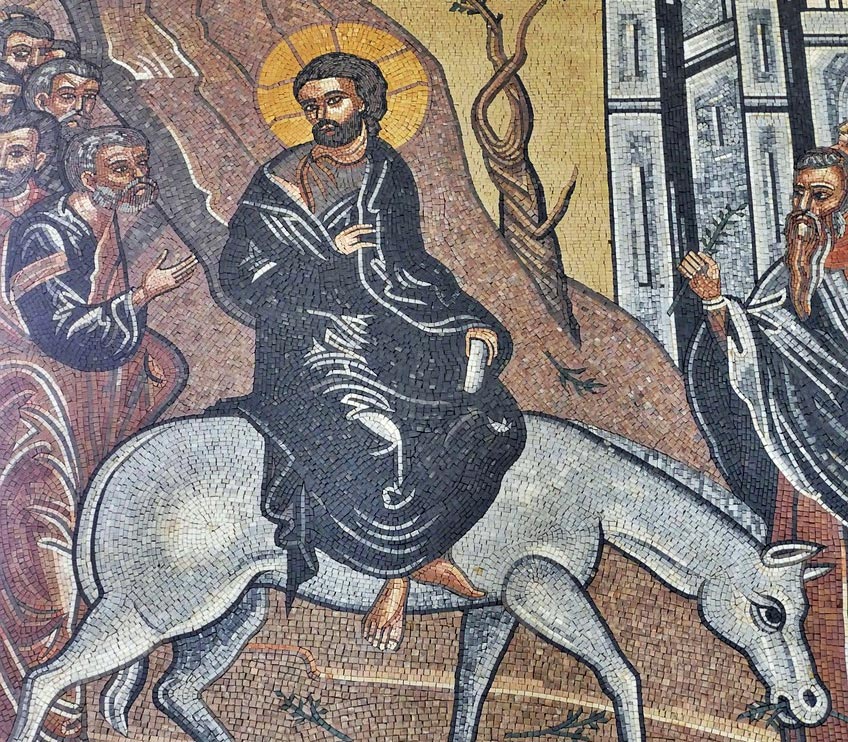Domingo de Ramos
Nos próximos dias somos convidados a encontrar o poder de uma antiga tradição que torna um período particular sagrado: chamamos de ‘Semana Santa’. Culmina nos três dias finais na transcendência do tempo, na explosão do presente eterno na dimensão humana do tempo e do espaço.
Se pudermos senti-lo como um convite, poderíamos experimentar a hospitalidade em seu sentido mais amplo. Hoje, a ‘indústria da hospitalidade’ significa pubs, restaurantes e hotéis e é uma parte importante da economia no setor de serviços. Espiritualmente e em sociedades tradicionais, no entanto, a hospitalidade é uma experiência de uma relação misteriosa na qual os papéis são invertidos e as oposições estão entrelaçadas.
Hoje, Domingo de Ramos, lembra a acolhida triunfal de Jesus em Jerusalém. A multidão de peregrinos que havia vindo para o festival religioso ficou eufórica e ele parecia estar em alta de uma maneira que uma celebridade ou político anseia. As pessoas queriam ver o homem que se dizia ter ressuscitado os mortos. Ironicamente, Jesus não chegou montado em um belo cavalo branco, mas sim em um jumento. Em poucos dias, a multidão se voltou contra ele e clamava por sua morte como blasfemo. Aquela hospitalidade de Jerusalém se mostrou superficial e falsa.
A palavra raiz para hospitalidade é o latim hospes, que estranhamente contém três significados: hóspede, anfitrião e estranho. Estranho também sugere ‘inimigo’ e vincula hospes também à palavra ‘hostil’. Estranhos são visitantes do estrangeiro e do desconhecido. Talvez sejam amigos em potencial. Mas não confie neles ainda, mesmo que venham trazendo presentes. A prudência diz tratá-los como amigos, até como visitantes divinos. Em algumas culturas, o anfitrião acolhedor torna-se responsável pela segurança e bem-estar do estranho, quer precisem de um hotel ou de um hospital. Na Índia, o princípio de Atithi Devo Bhava, o hóspede é Deus, deve sempre ser respeitado. Nas comunidades cristãs, o hóspede deve ser recebido como se fosse o próprio Cristo e em alguns países isso se aplica até os imigrantes. O Alcorão diz que até mesmo prisioneiros de guerra devem ser tratados como hóspedes.
Estranhos representam possíveis perigos; e talvez o costume social de uma hospitalidade exagerada seja uma forma de proteger o anfitrião deles. Mas mais profundo do que esse medo está a visão de Deus presente em todos. Essa visão surge da experiência simples e universal de parentesco humano. Algumas teorias dizem que há uma hostilidade oculta na hospitalidade, pois nos distancia do estranho. Mas além da teoria, na prática de um acolhimento gracioso e cortês, as projeções de divindade ou perigo no hóspede podem ser resolvidas. O Cristo em mim saúda o Cristo em você. A relação humana move-se para um nível mais elevado, quase o mais alto nível de não dualismo. Nesse ambiente, medo, divisão, conflito não podem sobreviver. Há paz e união.
Se vemos a Semana Santa como um convite, então, logo encontraremos essa paz mesmo através das intensas mudanças de humor e da conclusão trágico-transcendente dos dias seguintes. Faremos uma passagem de uma visão da vida vista através do prisma do medo para uma de confiança e fé. Vi a lua quase cheia e brilhante agora, saindo após a meditação. Ela é tanto hóspede quanto anfitriã e uma estranha familiar.
A festa da Páscoa é controlada e reconciliada por ela. Ela está de rosto cheio, inocente e adorável, e você pode se banhar em sua luz curadora e fresca sem nenhum medo.
Texto original
Palm Sunday
In the coming days we are invited to encounter the power of an ancient tradition that makes a particular period of time sacred: we call it ‘holy week’. It culminates in the final three days in the transcendence of time, the bursting of the eternal present into the human dimension of time and space.
If we can feel it as an invitation, we could experience hospitality in its fullest meaning. Today the ‘hospitality industry’ means pubs, restaurants and hotels and is an important part of the economy in the service sector. Spiritually and in traditional societies, however, hospitality is an experience of a mysterious relationship in which roles are reversed and oppositions are entwined.
Today, Palm Sunday, remembers the triumphal welcome of Jesus into Jerusalem. The crowd of pilgrims who had come for the religious festival went wild and he seemed to be riding high in a way that a celebrity or a politician longs for. People wanted to see the man reputed to have raised the dead. Ironically, Jesus rode in not on a beautiful white horse but on a donkey. In a few days, the crowd had turned against him and were clamouring for his death as a blasphemer. That hospitality of Jerusalem proved shallow and false.
The root word for hospitality is the Latin hospes which oddly contains three meanings: guest, host and stranger. Stranger also hints at ‘enemy’ and links hospes alsoto the word ‘hostile’. Strangers are visitors from the foreign and the unknown. Maybe they are potential friends. But don’t trust them yet, even if they come bearing gifts. Prudence says treat them as friends, even as divine visitors. In some cultures, the welcoming host become responsible for the safety and well-being of the stranger whether they need a hotel or a hospital. In India the principle of Atithi Devo Bhava, the guest is God, must always be respected. In Christian communities the guest must be welcomed as if they were Christ himself and in a few countries this even applies to immigrants. The Qu’ran says that even prisoners of war should be treated like guests
Strangers pose possible dangers; and maybe the social custom of exaggerated hospitality is a way of protecting the host from them. But deeper than this fear is the vision of God present in in everyone. That insight arises from the simple and universal experience of human kinship. Some theories say that there is a hidden hostility in hospitality as it distances us from the stranger. But beyond theory, in the practice of gracious, courteous welcoming the projections of divinity or danger on the guest can be resolved. The Christ in me welcomes the Christ in you. Human relationship moves into a higher level, almost the highest level of nondualism. In this atmosphere, fear, division, conflict cannot survive. There is peace and unity.
If we see Holy Week as an invitation, then, we may soon find this peace even through the intense changes of mood and the tragic-transcendent conclusion of the following days. We will make a passover from a vision of life seen through the prism of fear to one of confidence and trust. I saw the almost full bright moon just now, walking out after meditation. She is both guest and host and a familiar stranger.
Both Passover and Easter festivals are controlled and reconciled by her. She is full-faced, innocent and lovely and you can bask in her cool healing light without any fear.





